#deurywiol
Text
Bore da Cymblr! Do you know how to describe your sexuality in Welsh?
/
Bore da Cymblr! Ydych chi'n gwybod sut i ddisgrifio eich rhywioldeb yn Gymraeg?

Or write in the tags!
/
Neu sgwennu yn y tagiau!
#cymraeg#welsh#cwiar#lhdt#hoyw#lesbiaidd#deurywiol#panrywiol#hollrywiol#anrhywiol#anrhamantus#angyfunrhywiol#strêt#gê#heterorywiol
225 notes
·
View notes
Text
LGBTQIA+ Vocabulary in Welsh!
Hey, everyone! Since I'm a queer Welsh person, I figured it was important I share some of the common queer terminology we use in our day to day lives, but in Welsh! Enjoy!!
Lesbian - Lesbiaidd
Gay - Hoyw
Bisexual - Deurywiol
Transgender - Trawsryweddol
Pansexual - Panrywiol
Non-binary - Anneuaidd
Queer - Cwiar (Can also be seen just as queer)
Questioning - Cwestiynu
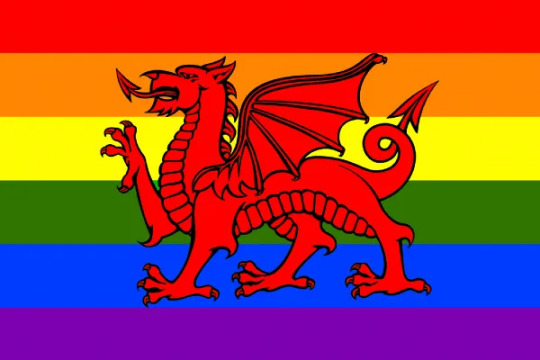
All the information on this post has come from Stonewall, who's page has more terms than what I'm sharing here. Please take a look if that interests you. Also, feel free to share any additions or corrections! <3
#cymraeg#dysgu cymraeg#welsh#cymru#wales#language#langblr#language learning#studyblr#vocabulary#vocab#vocab list#queer#queer representation#lgbtq#lgbtqia#pride#lesbian#gay#bisexual#transgender#pansexual
585 notes
·
View notes
Photo
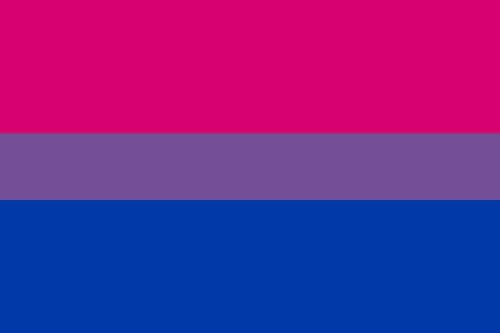
Happy bisexual awareness week! Wythnos ymwybyddiaeth ddeurywioldeb hapus i chi gyd!
Mae'r wythnos yma o'r 16 i 23 o Fedi, hyd at Ddiwrnod Dathlu Deurywioldeb ar y 23ain o Fedi. Dechreuodd y diwrnod hyn yn 1999 gan actifyddion hawlian deurywiol o’r UDA, Wendy Curry, Michael Page a Gigi Raven Wilbur. Dathliwyd Wythnos ymwybyddiaeth ddeurywioldeb hefyd ers 2014.
Bisexual awareness week is from the 16th to 23rd of September. It leads up to Celebrate Bisexuality Day on the 23rd of September, which was started in 1999 by bisexual rights activists of the US, Wendy Curry, Michael Page and Gigi Raven Wilbur. Bisexual awareness week has been celebrated since 2014.
#bisexual awareness week#bisexuality#celebrate bisexuality day#queer history#bisexual history#wales#welsh#cymraeg#m
15 notes
·
View notes
Text
Cofio hanes hoyw Cymru
Cofio hanes hoyw Cymru
[ad_1]
Mis Chwefror yw Mis Hanes LHDT (Lesbiaidd, Hoyw, Deurywiol a Thraws).
Daryl Leeworthy yw awdur A Little Gay History of Wales, ac mae’n rhoi crynodeb i BBC Cymru Fyw o hanes hoyw Cymru, sydd, ar y cyfan, yn anodd i ddod o hyd iddo, meddai.
Image copyright
Matthew Horwood
Bob blwyddyn, jest cyn Gŵyl y Banc mis Awst, mae…
View On WordPress
3 notes
·
View notes
Text
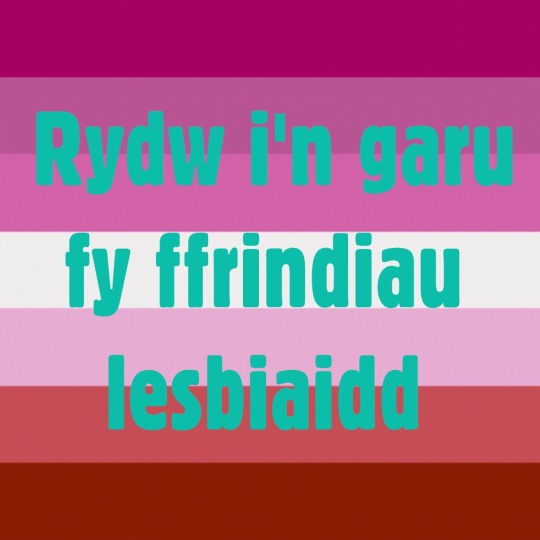


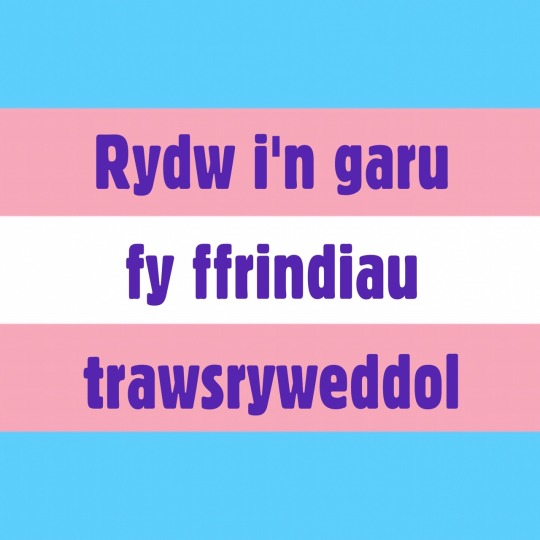
“I love my LGBT friends” in Welsh
Rydw i'n garu fy ffrindiau lesbiaidd
Rydw i'n garu fy ffrindiau hoyw
Rydw i'n garu fy ffrindiau deurywiol
Rydw i'n garu fy ffrindiau trawsryweddol
.
Please don’t hesitate to ask if you want another identity or language to be made - simply send the correct words in the language and I will make the edit
#pride round the world#transgender#lgbt#my own post#gay#lesbian#bisexual#ftm#mtf#welsh#cymraeg#mlm#wlw#nonbinary
47 notes
·
View notes
Text
🏳️🌈 LGBT Terms in Welsh 🏳️🌈
Disclaimer: I happen to be both Welsh and LGBT but I’ve not spoken extensively to others in the LGBT community in Welsh so a lot of these are dictionary terms and I’ll put a (?) next to anything I’m unsure about.
Homosexual (adj) - homorywiol / cyfunrywiol
Gay (adj) - hoyw
Homosexuality - gwrwgydiaeth (m)
Lesbian (noun) - lesbiad (f; pl: lesbiaid)
Lesbian (adj) - lesbiaidd (?)
Lesbianism - lesbiaeth (f)
Bisexual (adj) - deurywiol
Bisexuality - deurywioldeb (?)
Transgender (adj) - trawsrywiol
Transgenderism - trawsrywiaeth (?)
Asexual (adj) - anrhywiol
Asexuality - anrhywioldeb (?)
Sexuality - rhywioldeb (m)
Sex (both the act and a person’s sex) / gender - rhyw (m)
(Sexual) minority - lleiafrif (rhywiol) (m)
Same-sex marriage - priodas gyfunryw (f) Homophobia - homoffobia
Pronouns: Both he/him/his and she/her/her equivalents exist in Welsh, as with most languages. Since its prevalence in English, the singular “they” can also be used in speech (although it may be frowned upon academically, I can’t be sure).
Sorry this list isn’t nearly as extensive as I’d like it to be, but the Welsh dictionary isn’t as up to date as the English one and I’m going by what I think makes sense. If anyone else has any more terms/corrections, please contribute!
149 notes
·
View notes
Text
On Cadi as the Welsh equivalent of Queer

(image: screenshot of the entry for Cadi in Geiriadur Prifysgol Cymru)
Some of you may already know this, but for those who don't, Cadi is a Welsh word which is analogous to the word Queer in English. I say analogous, since their meanings aren't quite a 1:1 match. But for shorthand, Welsh equivalent of Queer sums 90% of it up.
It has been suggested tentatively by some to use Cadi as the Welsh translation of Queer. I'm going to explore arguments for and against, but ultimately the choice to use/not use Cadi as a 1:1 with Queer is entirely up to you. Warning that this post is quite long, but I do hope you'll stick with it- please let me know what you think in the notes!
Without further ado, let's get into it:
Definition of Cadi:
Cadi is a term which has existed in Welsh since the 17th Century (roughly) and generally refers to effeminacy in men (real or perceived). Over time, the meaning of the term has expanded to refer to other (Queer) things as well. But the term itself largely has been applied to Queer men and queer masculinities through time.
The term itself derives from the girl's name Catrin and you will come across women who call themselves Cadi as a shortening of their name (like Liz from Elizabeth and so on). In this way, there is a strong point of comparison to be had with the English queer pejorative Nancy, which also derives from a girl's name.
Can Cadi be considered the Welsh equivalent of Queer?
So now to the real meat of the post. Can Cadi be considered the Welsh equivalent of Queer? The answer to that is, unsurprisingly, complicated.
As described above, Cadi is a term which has had strong associations with male effeminacy (real or perceived) and has close parallels to the English term Nancy, which is also nearly exclusively applied to Queer men and masculinities. What this presents is a quandary and I'll explain what I mean by that. But first, we need to outline the history of LGBTQIA+ terminology in general (in the West).
LGBTQIA+ Terminology and the inclination towards cis gay language:
This is a huge huge topic which I cannot possibly do justice to here alone, so I'd highly recommend reading up on these topics when you have time, but for the sake of brevity, here is a tldr on the history of LGBTQIA+ terminology (slightly UK-centric but similar events also happened in the US and Canada, as well as other parts of Europe).
Campaign for Homosexual Equality (CHE) is a British Lesbian and Gay rights organisation founded in the 1960s, during a time of great social and political change. The organisation's membership grew and grew well into the 70s before declining in the 80s. It was during this time that some lesbian members of the organisation left citing erasure of lesbian issues and misogyny in the movement.
CHE and similar gay and lesbian rights movements in this period had been inclined to centre gay men's issues in their activism, which understandably led to many lesbians feeling alienated. Some lesbians left in the late 70s and early 80s and began to form their own advocacy groups. This indirectly fed into a wider feminist upheaval at the time and led to the rise of lesbian feminism, which aimed to centre lesbian issues within feminism, but unfortunately (for complex historical reasons) did then contribute to the proliferation of rad\ical femi\nism within the Queer community, which then unfortunately contributed to the rise of tra\ns exclu\sionary rad\ical fem\inism.
Regardless of the unfortunate rise of transphobia within the lesbian feminist movement, the original catalyst for the formation of these groups was a sense of alienation from the rest of the Queer community because gay men's issues had been prioritised over lesbian issues, when both could have been tackled together, with each other. This alienation was echoed in the names of organisations and events- many early homosexual rights groups only had homosexual or gay in their group names. It took many years before advocacy groups started adding 'and lesbian' to their names and events.
(For further reading, I would suggest watching this video by Verilybitchie about the history of lesbian erasure in homosexual advocacy and how that led to (some) lesbian groups excluding bi and trans people in the same way they were excluded by gay men)
What does that history mean for Cadi?:
Because of a history of lesbian (and by extension, women's) exclusion from homosexual advocacy groups, is Cadi the best term to use as a catch-all given its strong associations with men's expressions of Queerness? (namely, that as a pejorative it is largely aimed at femininity in men and subsequent assumed homosexuality). It is important to consider if using Cadi as an equivalent of Queer would centre a (typically cis) gay experience/expression of Queerness and if that would alienate other members of the LGBTQIA+ community.
However, a counterpoint to this would be that there are variations of the term Cadi which do include other experiences of Queerness:
Cadi ffan (similar to just 'Cadi')- typically used to describe femininity in men and boys [N. Wales]
Cadi genod/ Cadi merched (similar to above) - effeminate man/boy [N. Wales]
Cadi bechgyn - Romping girl, tomboy [N. Wales]
Cati fachgen - (similar to above)- Romping girl, tomboy [S. Wales]
Cadi Haf - Male maypole dancer dressed as a girl
They are, however, somewhat limited for use in reclamation and have to be qualified by another noun to indicate diversion from the original term's meaning.
But when talking about the term Cadi, we often speak in the abstract- without the context in which the term is used. So here are a few extracts from texts which use the term Cadi (or variants). Since this is a mostly spoken slang term, it doesn't turn up in print often, but there are a few examples to draw on.
Examples of Cadi in texts:
Page 164- Cwm Eithin by Hugh Evans (1931):
"DAWNSIO HAF
Ceir darnodiad o'r ddefod hynafol dawnsio haf yn Y Gwyl- fedydd, 1823, tudal. 306, gan un a'i geilw ei hun “ Callestrwr,” fel yr arferid hi yn Callestr (Fflint, mae'n debyg). Ym mis Ebrill arferai o ddwsin i ugain o bobl ieuainc ymuno i baratoi ar gyfer y ddawns. Gwisgai'r dawnswyr eu crysau yn uchaf wedi eu haddurno ag ysnodennau a blodau. Cariai'r arweinydd fforch bren ar lun y llythyren Y. Gwnïid lliain o'r naill fraich i'r llall, ac addurnid y fforch ag amryw lestri arian, tebotiau, llwyau, cigweiniau, efc. Byddai gyda hwy grythor yn ei ddillad ei hun, “cadi” mewn gwisg merch, ac ynfytyn mewn gwisg ryfedd â phlu yn ei ben"
[emphasis mine]
This extract is the author's account of Dawnsio Haf- a Summer dance held on May Day and his investigations into it. At his time of writing (1931) the practice has died out, but later in this chapter he interviews an old woman from the Conwy Valley who participated in the dances as a child. Evans draws upon a source from 1823 for his description of Dawnsio Haf. In it, he mentions that 20 young dancers meet up for the dance wearing shirts decorated with ribbons and flowers. A leader carries a fork in the shape of the letter "Y"- between each point on the "Y" a cloth was strung with silverware dangling from it to make noise. With the 20 dancers would be a crwth-player (crythor), a Cadi in women's clothes and a fool with a feather on his cap and odd clothes.
This usage is quite archaic and refers to a folk dance- much like mumming or morris-dancing. There is however, a picture in the People's Collection Wales titled 'Cadi'r Big' taken by the prolific photographer John Tomas c. 1875, near Y Ro-wen:
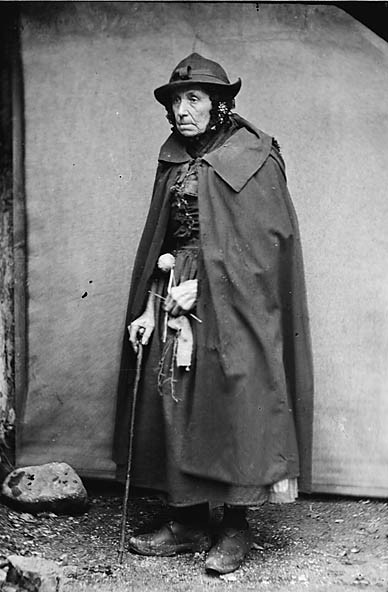
Which is very interesting as Cadi'r Big has dried flowers and ribbons attached to their clothes, much like in the description in Cwm Eithin. This is very likely a picture of a "Cadi" from a Dawnsio Haf.
Page 4- Y Ddraig Binc Issue 4 (1994):
Y Ddraig Binc was a Welsh-language Queer magazine published by CYLCH, a gay and lesbian rights organisation based in Aberystwyth. The term Cadi-ffan is included in an article about the commercialisation of Queer identity in the magazine's fourth edition.
"...Nawr te, medd wrtho’i hun, be’ gymera’ i’r mis hwn, copi o GQ ynte Arena neu ydw i, efallai, yn teimlo’n ddigon ifanc a trendi am Sky? Ond aros funud, beth yw hyn? Dau gylchgrawn steil newydd a gwynt digamsyniol cadi-ffan arnyn nhw?
Ydy, mae’r hyn a oedd y tu hwnt i ddychymyg wedi digwydd.
Mae grymoedd y farchnad rydd a chystadleuaeth wedi cyrraedd y byd
cyhoeddi hoyw - rhaid bod Lêdi T wrth ei bodd. Nawr fe gaiff llanc hoyw ddewis o ddeunydd darllen sgleiniog, llawn erthyglau a hysbysebion yn arbennig ar ei gyfer ef a’i rywioldeb. Hwrê! Fedr hynny ddim bod yn beth drwg. Neu a fedr o?..."
[emphasis mine]
This humorous article (dealing with an important topic, mind) pokes fun at the arrival of Queer commercialisation. The article opens by explaining that there's a ruckus in the gay world (and not two old queens getting into fisticuffs)- but that this ruckus is taking place at WHSmith (UK stationery shop and newsagents)- apparent winner of this year's most vulgar uniform award. The author goes on to describe a hypothetical situation in which a gay man walks into a WHSmith to buy a magazine. He wonders whether to get a copy of GQ or Arena (men's style magazines- remember this was published in Section 28 Era so explicitly gay magazines were not common) or is he trendy enough to read Sky? (film and tv magazine). But wait- what's this? Two new style magazines with a whiff of Cadi-ffan about them? The author explains that yes, the unimaginable has happened. The forces of the free market and competition have reached the world of gay publishing.
Now a gay youth has the choice of glossy reading material, full of articles and advertisements especially for him and his sexuality. Hooray! That can't be a bad thing. Or can it? Writes the author. The article is very witty and I recommend a read (find a pdf copy here). But the usage of Cadi-ffan here is very much in a reclaimed sense. Though it must be noted that the story is told through a stereotypical cis gay lens.
Conclusions:
As I said at the start of this post, you are free to claim or not claim Cadi as you wish. However, as awareness of Welsh LGBTQIA+ terminology increases, I wanted to raise important questions and start a conversation about the words we have, what we want them to be and how they have been used against us. I hope in any case that this post has been interesting to you. If it has, please reblog this or add any comments/thoughts in the notes, tags or in my asks.
Beth yw eich barn chi? I'd love to hear other's thoughts on this and start a conversation about it! Diolch am ddarllen
#cymraeg#cwiar#cadi#cadi ffan#Welsh#Gymraeg#yr iaith gymraeg#term reclaiming#hoyw#lhdt#deurywiol#lesbiaidd#cymru#long post
308 notes
·
View notes
Text
Gilbert Baker pride flag stripe meanings yn Gymraeg

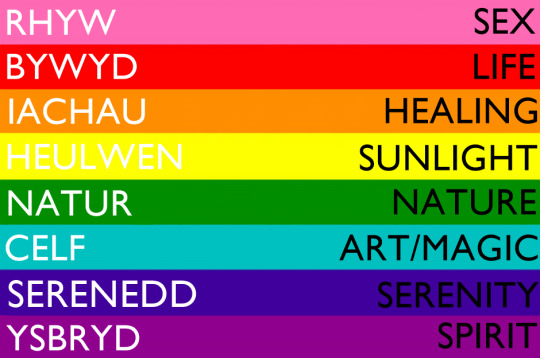

Made some edits of the Gilbert Baker pride flag with the meanings in Welsh. Free to use with credit/link to me.
#cymraeg#cwiar#welsh#hoyw#deurywiol#trawsryweddol#lesbiaidd#cymru#lhdt#gilbert baker flag#gymraeg#uk trans#uk#Wales
334 notes
·
View notes
Text
Llyfr Enfys x Hanes LHDT+ Cymru
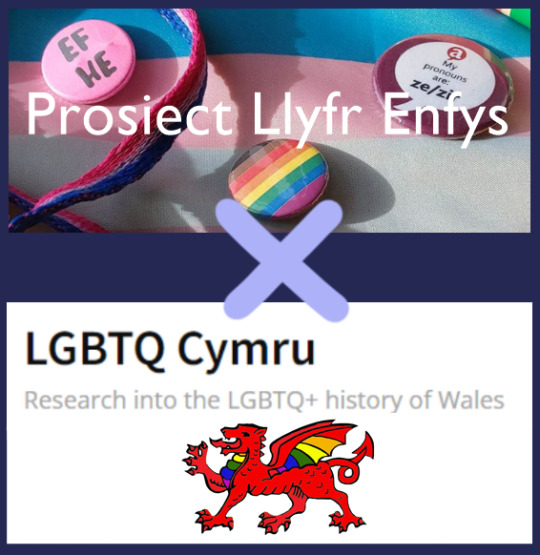
Helô pawb! I am here today with to announce that I've been working with Hanes LHDT+ Cymru to publish the second chapter of my undergraduate dissertation "What drove the development of Welsh-language LGBTQIA+ terminology 1972-2022” for free on their blog!
Find the chapter here: https://lgbtqcymru.swansea.ac.uk/2023/10/03/the-post-1957-shift-in-lgbtqia-language-in-wales/
Some of you may also remember that I have worked with Hanes LHDT+ Cymru before and written some blogs for them. You can find them here:
Term Anniversaries- Vital Landmarks for Welsh LGBTQIA+ History (April 2023)
A brief history of Lesbian, Bisexual, Trans, Intersex and Other terminology in Welsh dictionaries (Nov 2022)
Rhagenwau Rhyfedd- The Wonderful World of Weird Welsh Pronouns (Sept 2022)
Queer Ancestry- A look into the familial lives of some of Wales’ Queer historical figures (July 2022)
Papurau Pinc | Pink Papers: 18th-21st Century Welsh language newspaper reporting on Queer folk (June 2022)
The Case of the 450 year-old Word: A Queer Welsh slur throughout the centuries (June 2022)
#cymraeg#cwiar#welsh#hoyw#lhdt#llyfr enfys project#prosiect llyfr enfys#hanes lhdt cymru#cymru#trawsryweddol#deurywiol#lesbiaidd
122 notes
·
View notes
Text
Welsh Gender Neutral Family Terms
We've come up with some gender neutral Welsh family terms in the LGBTQIA+ Welsh discord I run (dm for link) lately and so far people seem to like the terms. So, this is an introduction to some of the terms we've come up with so far.
I plan to make polls eventually with these terms and any other suggestions you might have and run a little tournament to see which terms are favoured most by Welsh speaking LGBTQIA+ people.
Without further ado, here are the terms:
(f. = feminine grammatical gender, m. = masculine grammatical gender)
Chwaed(ion) f. - Sibling(s)
[‘chwaer’ (sister) + ‘brawd’ (brother). Rhymes with ‘gwaed’ (blood), reminiscent of family ties]
Chwaerydd m. - Sibling
['chwaer' + '-ydd' (masculine suffix) ]
Chwaed fy mam / fy nhad - Aunt/Uncle (Literally, my mother’s/father’s sibling)
[Literal translation (my mother’s / father’s sibling) ]
Naith f. - Niece/Nephew
[‘nith’ (niece) + ‘nai’ (nephew) ]
Dain (Deiniau) f. - Grandparent(s)
[‘taid’ (grandfather)+ t > d + ‘nain’ (grandmother) ]
Nam-gu f.- (Grandparent)
['fy nhad-cu' + 'fy mam-gu']
Of course, these are only suggestions. So far, chwaed has been very popular and dain has been preferred over nam-gu because it's less South Walian. But I'm interested to hear what you think or hear if you have any suggestions of your own!
Please share this post so we can get a larger sample size. Diolch!
NB:
These terms have come from multiple users, so bear that in mind with feedback. I can pass on suggestions to the users who coined them.
Grammatical gender is unavoidable in Welsh, but grammatical gender does not necessarily equal gender gender. E.g. the German word for girl 'maedchen' is grammatically neutral. In addition to this, certain suffixes in Welsh are gendered, which affects how words behave in certain sentences.
#Welsh#gender neutral#neutral terms#nonbinary#anneuaidd#LHDT#cwiar#langblr#Welsh terms#Cymraeg#Gymraeg#hoyw#trawsryweddol#deurywiol#lesbiaidd#lhdt#cymru
341 notes
·
View notes
Text
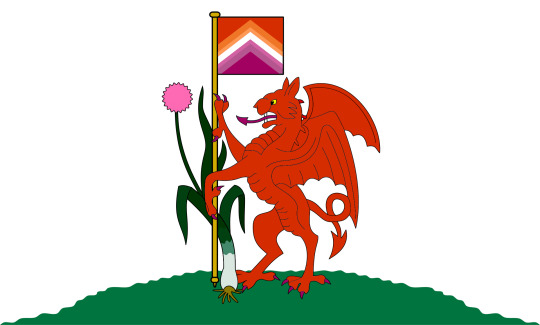
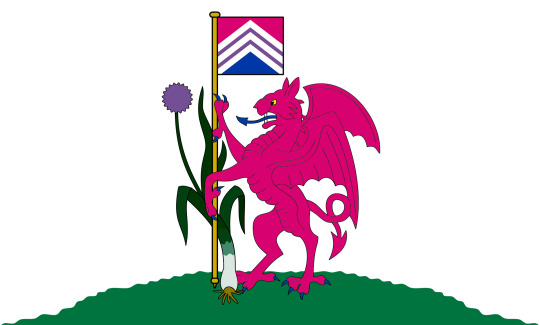

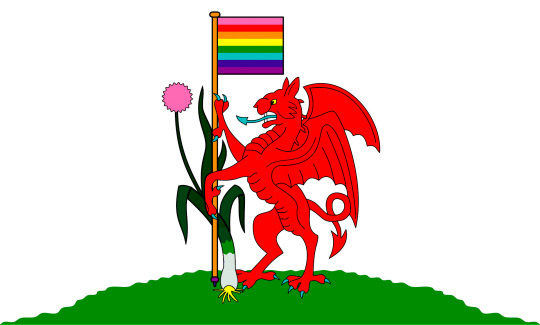
A collection of Cardiff flag/Pride flag mashups!
152 notes
·
View notes
Text
LHDTC+ : Acronym heb Q / LHDTC+ : Acronym without Q
P'nawn da pawb,
Mae'r post hwn yw'r post cyntaf yn fy system ddwyeithog newydd. Mae'r Cymraeg sy'n dod yn gyntaf a Saesneg yn ail.
Afternoon pawb,
This post is the first post using my new bilingual system. Welsh is first and English is second.

[Fersiwn pinc o'r ddraig yn y faner hon/Pink version of the dragon on this flag]
Mae'r acronym Saesneg LGBT fel arfer yn cael ei sgwennu fel LHDT yn Gymraeg. Ond beth am y Q+?
Fi'n gweld 'LHDTQ+' yn aml - ond does dim llythren Q yn yr alffabet Gymraeg. Felly beth am C+?
Mae'n amhosib siarad am yr acronym heb sôn am yr hanes yr acronym yn Gymraeg. Ar hyn o bryd, mae'r sôn cyntaf am yr acronym yn Gymraeg yn "Storïau sy'n rhoi siâp ar fywyd" gan West Rhyl Young People’s Project yn 1994. Ar dudalen 4 mae'n dweud "LHD" ar gyfer LGB. Ar ôl LHD, mae LHDT yn cyrraedd yn "Canllaw Cryno i Gymunedau LHDT: Ar Herio Adroddiadau Negyddol Yn Y Cyfryngau" gan y Comisiynydd Plant Cymru yn 2015.
Hefyd, mae'n amhosib siarad am yr acronym heb sôn am Q am 'Queer' neu Q am 'questioning'. Mae'r ddau, y ddau yn dda iawn. Ond yn y Gymraeg mae trydedd ongl: C am 'Cwiar' neu Cadi'?
Siaradodd Mihangel Morgan ar 'theori Cadi' yn Queer Wales (2016). Mae Morgan yn hoffi gwell Cadi na Cwiar fel term cymunedol ac mae yna rai sy'n cytuno ag e. Ar y llaw arall, mae rhai pobl yn hoffi Cwiar. Ac mae rhai pobl yn hoffi'r ddau. Fi'n hoffi'r ddau yn bersonol. Ond fi'n meddwl ei fod yn bwysig dangos y sgwrs o gwmpas y pethau 'ma.
Beth yw eich barn chi? Atebwch isod neu mewn neges neu drwy fy mocs gofyn!
/
The English acronym LGBT is usually written as LHDT in Welsh. But what about the Q+?
I see 'LHDTQ+' often - but there is no letter Q in the Welsh alphabet. So what about C+?
It is impossible to talk about the acronym without also mentioning the history of the acronym in Welsh. Currently, the first (known) mention of the acronym in Welsh is in "Stories which give shape to lives" by West Rhyl Young People's Project in 1994. On page 4 it has "LHD" for LGB. After LGB makes a debut, the acronym LGBT arrives in "A Brief Guide for LGBT Communities: Challenging Negative Media Reports" (tr.) by the Children's Commissioner for Wales in 2015.
It is also impossible to talk about the acronym without mentioning whether it is Q for 'Queer' or Q for 'questioning'. Both, both are good. But in Welsh there exists a third angle: Q for 'Cwiar' or Cadi'?
Mihangel Morgan has spoken about 'Cadi theory' in Queer Wales (2016). Morgan has established that he prefers Cadi to Cwiar as a community term and there are some who agree with him. On the other hand, other people prefer Cwiar. And some people just like both. I like both personally. But I do think it is important to show the conversation around these things on here.
What do you think? Reply below or in a message or an ask!
#hoyw#cwiar#LHDTC#cymraeg#welsh#cymru#luke's originals#LGBTQ+ acronym#acronym#queue#cyw#trawsryweddol#lesbiaidd#deurywiol#cadi
123 notes
·
View notes
Text
Followers- Dw i angen eich help / I need your help
This is a post I've been sitting on for a while and it's time I finally write it to let you all know how I am, where I'm at and the progress of Prosiect Llyfr Enfys.
So, as I alluded to in previous posts, I had a health scare at the end of May which landed me in the hospital. I've spent June recovering from that and dealing with a few life changes as well (which I will talk about later).
Unfortunately, me and my partner had to deal with an unexpected bill of £200 this month which had to come directly out of my savings and is a huge chunk of it.
I've been doing research in preparation for hopefully doing a Masters at Aberystwyth in September on the topic of LGBTQ+ Welsh terminology before the 20th Century. My undergraduate dissertation was on the topic of 20th-21st Century LGBTQ+ Welsh terminology (which is currently unmarked due to the marking boycott). Hopefully after graduation I can share it with you. But my research into older terminology means needing to travel to different archives and libraries in Wales, which at the minute, I just can't afford. The closest place would be Bangor, but I have no money to spare at the minute and Prosiect Llyfr Enfys is not funded by any scheme or grant- it's currently all funded by myself.
For the first time in my life, I've been considering using a food bank. We're not quite at that stage yet, but it's precarious. It's another unexpected bill away from a critical situation.
Currently, my monthly expenses for anything related to the dictionary totals around £40 (subscriptions to archives, libraries, genealogy research tools) which have been instrumental in my work. For example, I couldn't have written my articles for Hanes LHDT+ Cymru without access to ancestry sites or online newspaper archives. This does not include other expenses such as bus tickets to get to the National Library of Wales when I need to, or costs of purchasing dictionaries in order to source them in my work.
All of this is to say that i need your help:
I have a patreon which I will be posting in next in July- if you enjoy Prosiect Llyfr Enfys and want to help keep it going, please consider subscribing today by clicking the link above or in my bio. The lowest tier is affordable and if you have the cash to spare, will enable me to keep on working on the project. If you want to make a one-time donation, I'm considering enabling tips on tumblr for those who would prefer that.
If enough people are able to subscribe to keep the project going, I can start to make some concrete plans for a trip to Bangor and share my journey with you all and involve you in the trip. If I'm unable to raise enough funds, I will have to make the decision to pause the project until after my Master's. I do not currently have a publisher, which is also a big factor in that decision, if I need to make it.
All your support is greatly appreciated- if you cannot donate, please share this post.
As ever, huge huge diolch yn fawr to everyone who has supported the project so far- with your help, we can get this dictionary published to help benefit the whole Welsh LGBTQ+ community and beyond.
#cymraeg#lhdt#patreon donation#cost of living#cwiar#welsh#hoyw#trawsryweddol#cymru#deurywiol#lesbiaidd#minimum wage#low income#unexpected bill#support queer creators#queer writer#queer non fiction#lgbt creator#lgbt non fiction#lgbt writer#hospital cw#food insecurity#Bangor#Aberystwyth#Mid Wales
147 notes
·
View notes
Text
Welsh LGBTQIA+ Terms IPA Pronucniation:
Anneuaidd- Nonbinary /anei̯ai̯ð/
Anrhamantus- Aromantic /anr̥amantɪs/
Anrhywiol- Asexual /anr̥ɪu̯jɔl/
Cwiar- Queer /ˈkw̥ʰjar/
Cyfunrhywiol- Homosexual /ˈkəvɪnr̥ɪu̯jɔl/
Deurywiol- Bisexual /ˈdei̯r̥ɪu̯jɔl/
Hollrywiol- Pansexual /hoːɬr̥ɪu̯jɔl/
Hoyw-Gay /ˈhɔi̯.u/
Lesbiaidd- Lesbian /lɛsbi̯ai̯ð/
Rhyngryw- Intersex /r̥əŋr̥ɪu̯/
Rhyweddgwiar- Genderqueer /r̥əwɛð'gw̥ʰjar/
Trawsryweddol- Transgender /trau̯sr̥əwɛðɔl/
Following the previous post, my informal/casual transcription left too much ambiguity, so I've taken it upon myself to learn the International Phonetic Alphabet (IPA) to help make things a lot clearer for those interested.
#Welsh#IPA#international phonetic alphabet#Cymraeg#Cwiar#LHDT#cymraeg#cwiar#hoyw#trawsryweddol#deurywiol#lesbiaidd#cymru#welsh#lhdt
170 notes
·
View notes
Text
'Wel dyma ni'n mynd' (Welsh wassailing song Queer parody)
P'nawn da pawb! I'm here with my last Patreon post this year. This one's public and it's just a lil lighthearted project I've been working on. This one's (part of) my queer Mari Lwyd project!
It's a nonserious parody of a traditional Welsh wassailing song (linked in patreon post) associated with the Mari Lwyd. In this parody instead of going house to house for booze the Mari Lwyd is gathering lesbians, gays, bisexuals, trans people and queer people as she goes along (thereby creating a pride parade). It's just a bit of fun and nothing too serious. So with the above in mind...
Introducing: Y Fari Lliwgar (The Colourful Mari)!
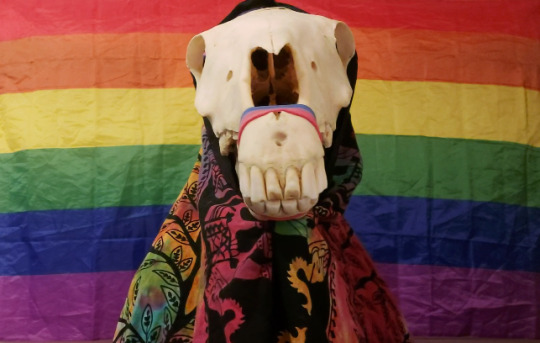
I also was working on a little video of my horse skull puppeted by me as a gay Mari Lwyd (technically March Lwyd as this skull belonged to a male horse as far as I know). The above is a still taken from the video footage. It was meant to be longer but unfortunately I ran out of time. But I hope you enjoy the concept of a Queer Mari Lwyd assembling a pride parade going house to house! You can watch the video here:
youtube
Nadolig Llawen!
#cymraeg#welsh#mari lwyd#y fari lwyd#lhdtc+#cwiar#hoyw#cymru#trawsryweddol#lesbiaidd#deurywiol#wassail#horse skull#welsh folklore#welsh traditions#Youtube#cymblr
29 notes
·
View notes
Text
New Features in the Discord!
If you didn't know, I run a bilingual Welsh LGBTQIA+ Discord (dm for link) for anyone 16+ who speaks or is learning Welsh. The server is three years old next year and has had some new features added recently after we ran a survey a few months ago!
New Features:
#history/hanes, #linguistics/ieithyddiaeth, #visual art/celf-weledol and animals/anifeiliad channels added to the chatrooms roster
#question of the day / cwestiwn y dydd channel added (Welsh language)
#breuddwyddion channel added (a channel to describe your dreams in Welsh for description practice! No nightmares though)
Send a dm if you are interested! Diolch
44 notes
·
View notes